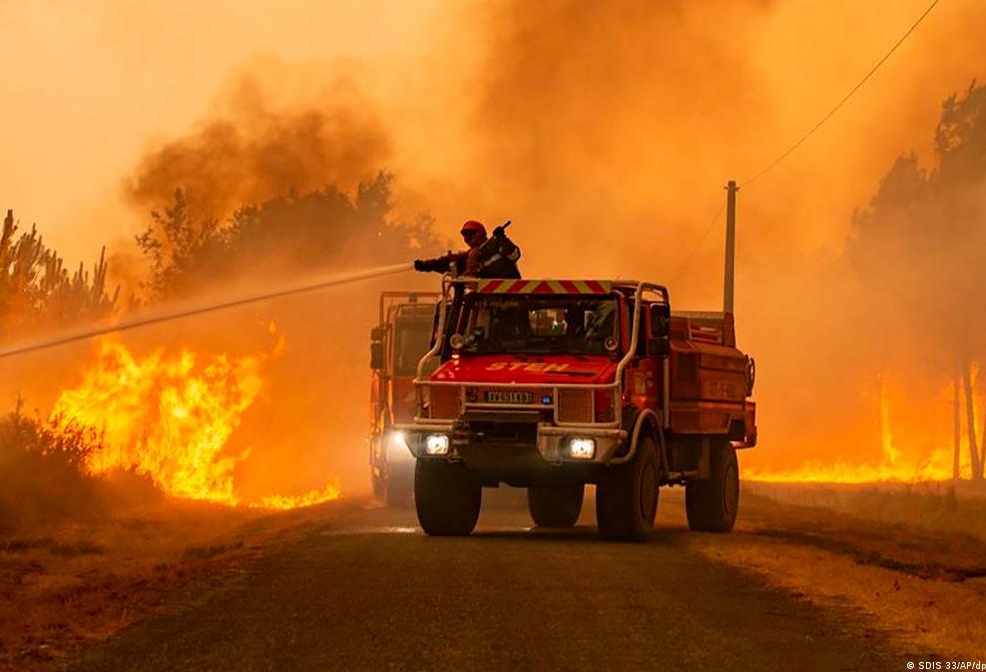



'Unprecedented' start to wildfire season destroyed almost 3 million hectares of forest: Blair

Baku, June 2, AZERTAC
An "unprecedented" start to the wildfire season in Canada has led to serious wildfires spreading destruction and forcing evacuations across seven provinces and one territory, Emergency Preparedness Minister Bill Blair said Thursday, according to CBC.
Blair told reporters that over the month of May, roughly 2.7 million hectares of forest — an area equal to about five million football fields — went up in flames in B.C., Alberta, Saskatchewan, Manitoba, Ontario, Nova Scotia, New Brunswick and the Northwest Territories.
"These conditions this early in the season are unprecedented and of course they are deeply concerning to all Canadians," Blair said, adding that over the past 10 years, the average number of hectares burned in May was only 150,000.
At a media briefing Thursday morning, government ministers confirmed that 211 fires are burning now — 82 of them out of control — and said the crisis is being driven by climate change.
"It's a simple fact that Canada's experiencing the impacts of climate change, including more frequent and more extreme wildfires," Natural Resources Minister Jonathan Wilkinson said.
"The amount of forest burned by wildfires is projected to double by 2050 due to our changing climate."
Mike Flannigan, who studies wildfire management at Thompson Rivers University, told CBC News climate change drives up the frequency of wildfires for several reasons.
The seasons of dry, hot weather are getting longer, he said, and hot weather brings more lightning strikes. While lightning only causes half of the fires in Canada, fires caused by lightning consume more than 85 per cent of the area destroyed by wildfires annually.
And a warmer atmosphere sucks more moisture out of trees and other vegetation, giving wildfires more fuel to burn.
"Not every year is going to be a crazy year like this year," he said. "Some years will be cooler in weather. But overall, we're going to see a lot more fire."
Flannigan said that since the 1970s, the area burned annually by wildfires in Canada has doubled, while the burned area in the Western United States has quadrupled.
"Is that coming here? I think so," he said. "I think we're seeing it already in parts of the West like B.C. and now Alberta, but as we continue to warm I expect to see it in Eastern Canada as well."
Wilkinson said the federal government is investing in additional measures to cope with an annual wildfire season that is expected to get worse.
Wilkinson said Ottawa will participate in an international pilot project to train firefighters from towns and cities to respond to forest fires that threaten homes and businesses.
Wilkinson also said his government has provided $170 million to develop the WildFireSat system, expected to be operational by 2029. It's being billed as the world's first "purpose-built public satellite system" created to monitor wildfires.
The Liberal government also announced that it has signed agreements with nine Indigenous communities and organizations to train more than 300 Indigenous firefighters and 125 fire guardians across the country.
Flannigan said these initiatives are "all good things" but he would like to see more effort going into firefighting intelligence and forecasting.
He also said the practice of closing off some forested areas to people, adopted by Alberta and Nova Scotia, is reducing the number of human-caused fires.
"You take industry and you take recreation out of ... the forest, there can be no people-caused fires," he said.
Blair said his government has approved the request for assistance it received from Nova Scotia on Wednesday. The military will be providing planning and coordination support and firefighting resources.
"These additional firefighting resources will be used to relieve firefighters who've been working tirelessly around the clock to protect communities right across Nova Scotia," he said.
Blair said the Canadian Coast Guard, the Canadian Armed Forces, Transport Canada and the Public Health Agency of Canada are all helping the province in various ways.
He said that later Thursday, the federal government would be able to provide details about firefighter numbers and resources.
"They're doing an extraordinary job, but quite frankly they need help. They need relief and they need additional resources," Blair said.
"That is a particularly dangerous fire and we're very concerned that it actually threatens a number of communities and other critical infrastructure in southern Nova Scotia, and so we'll move as quickly as possible to bring them that relief.
"We have been able to mobilize additional firefighting resources and personal from across Canada and around the world to assist with the response in Alberta, the Northwest Territories and in Nova Scotia."
There are about 2,400 firefighters in Alberta now; 800 of them came from the United States to help. Another 224 are from Australia and New Zealand and 215 are expected to arrive from South Africa shortly.
Dubai airport limits arriving flights amid storm backlog
NASA greenlights 2028 launch for epic Dragonfly mission to Saturn's huge moon Titan
Baiba Braze appointed Latvia's foreign minister